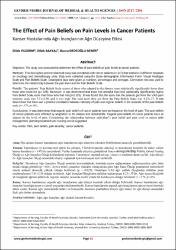| dc.contributor.author | Yıldırım, Dilek | en_US |
| dc.contributor.author | Baykal, Dilek | en_US |
| dc.contributor.author | Dedeoğlu Demir, Burcu | en_US |
| dc.date.accessioned | 2021-06-16T10:20:20Z | |
| dc.date.available | 2021-06-16T10:20:20Z | |
| dc.date.issued | 2020 | en_US |
| dc.identifier.citation | Yıldırım, D., Baykal, D., & Demir Dedeoğlu, B. (2020). The Effect of Pain Beliefs on Pain Levels in Cancer Patients. Gevher Nesibe Journal of Medical & Health Sciences, 5(8), 15–21. | en_US |
| dc.identifier.issn | 2717-7394 | |
| dc.identifier.uri | http://dx.doi.org/10.46648/gnj.86 | |
| dc.identifier.uri | https://hdl.handle.net/20.500.12294/2762 | |
| dc.description.abstract | Objective: The study was conducted to determine the effect of pain beliefs on pain levels in cancer patients. Methods: This descriptive and correlational study was completed with cancer patients (n=147) that treated in 3 different hospitals on oncology and chemotherapy units. Data were collected using the Socio-demographic Information Form, Visual Analogue Scale and Pain Beliefs Scale. Descriptive data were given as numbers, percentages and averages. Correlation test was used to determine the relationship between the pain level and the Pain Beliefs Scale. Results: The patients’ Pain Beliefs Scale scores of those who adapted to the disease were statistically significantly lower than those who could not (p=.028). Moreover, it was determined that those had stressful lives had statistically significantly higher Pain Belief Scale score that those who had not (p=0.025). It was found that the score that the patients got from the VAS pain intensity scale was 7.41±2.50, and it was high. The total score they got from the Pain Beliefs Scale was 4.23±.37. It was determined that there was a positive correlation between intensity of pain and organic beliefs in the subscale of the pain beliefs scale (r=.179, p˂.05). Conclusions: It was determined that organic pain beliefs of cancer patients have an impact on the level of pain. The pain beliefs of cancer patients were affected by adaptation to the disease and stressful life. Organic pain beliefs of cancer patients have an impact on the level of pain. Considering the relationship between individual’s pain belief and pain level in cancer pain management, planning treatment and nursing care is suggested. | en_US |
| dc.language.iso | eng | en_US |
| dc.publisher | Gevher Nesibe Sağlık Araştırmaları Merkezi | en_US |
| dc.relation.ispartof | Gevher Nesibe Journal of Medical & Health Sciences | en_US |
| dc.identifier.doi | 10.46648/gnj.86 | en_US |
| dc.identifier.doi | 10.46648/gnj.86 | |
| dc.rights | info:eu-repo/semantics/openAccess | en_US |
| dc.subject | Pain | en_US |
| dc.subject | Pain Beliefs | en_US |
| dc.subject | Pain Severity | en_US |
| dc.subject | Cancer Patients | en_US |
| dc.title | The Effect of Pain Beliefs on Pain Levels in Cancer Patients | en_US |
| dc.title.alternative | Kanser Hastalarında Ağrı İnançlarının Ağrı Düzeyine Etkisi | en_US |
| dc.type | article | en_US |
| dc.department | Sağlık Bilimleri Yüksekokulu, Hemşirelik Bölümü | en_US |
| dc.authorid | 0000-0003-1836-2897 | en_US |
| dc.identifier.volume | 5 | en_US |
| dc.identifier.issue | 8 | en_US |
| dc.identifier.startpage | 15 | en_US |
| dc.identifier.endpage | 21 | en_US |
| dc.relation.publicationcategory | Makale - Uluslararası Hakemli Dergi - Kurum Öğretim Elemanı | en_US |


















